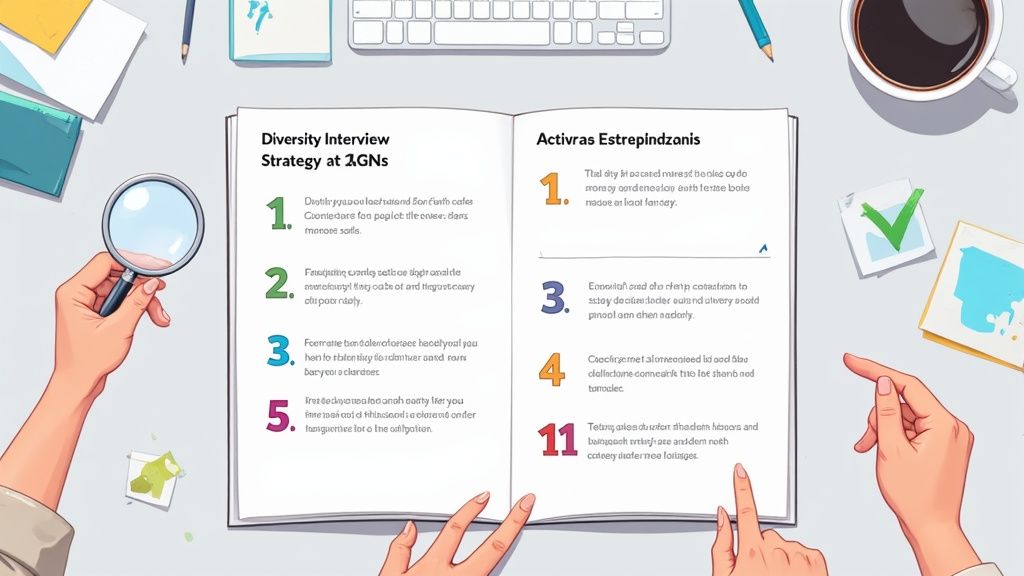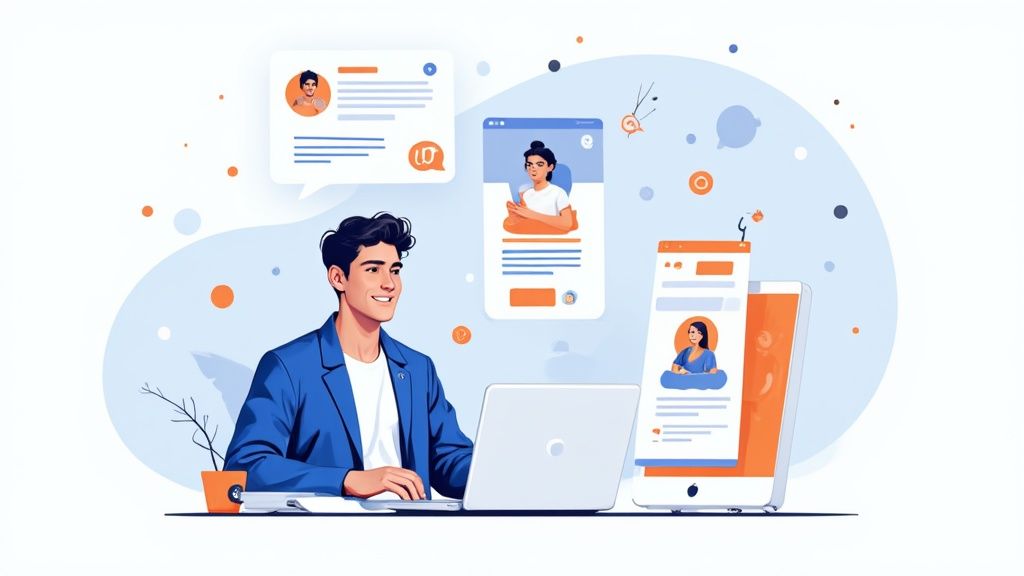8 Essential First Job Interview Tips for Success in 2025
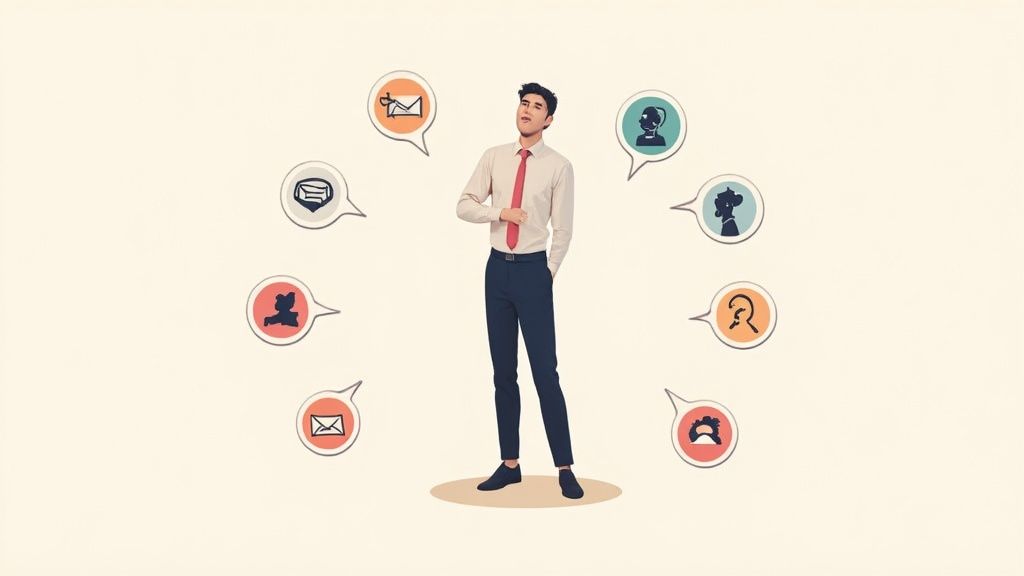
Stepping into your first job interview can feel like a high-stakes performance where you're both the star and the entire crew. The pressure is on, the competition is fierce, and making a memorable first impression is everything. But don't let the nerves win. With the right preparation and strategy, you can transform this challenge into a career-launching opportunity. This guide provides a comprehensive breakdown of essential first job interview tips designed to give you a competitive edge.
We'll move beyond generic advice like "be confident" and dive straight into actionable strategies. You'll learn how to master the STAR method for answering behavioral questions, how to research a company so thoroughly you seem like a long-time employee, and how to prepare thoughtful questions that make the interviewer see you as a serious candidate.
This isn't just about what to say; it's about how to prepare. We'll show you how to demonstrate cultural fit, handle tricky salary discussions, and perfect your professional appearance. This list is your blueprint for walking into that room with unshakable confidence and leaving a lasting, positive impact. Let's get you ready to not just answer questions, but to tell a compelling story about why you're the perfect fit.
1. Research the Company Thoroughly
Walking into your first job interview without knowing the company is like showing up for a final exam you haven't studied for. Superficial research won't cut it. True preparation involves a deep dive into the organization’s mission, values, recent news, and market position. This foundational step is one of the most critical first job interview tips because it transforms you from a generic applicant into a candidate who is genuinely invested in the company's success.
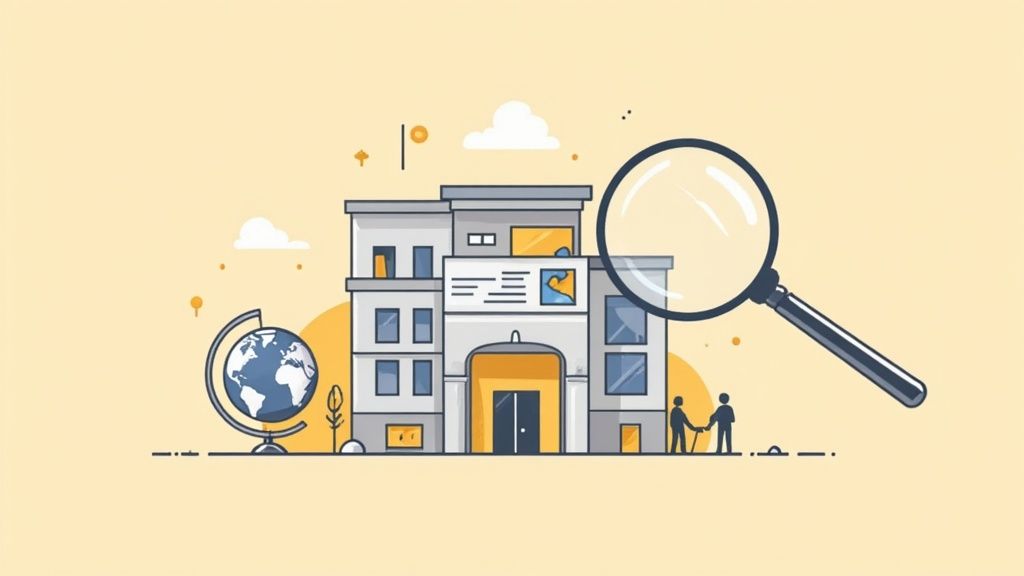
This level of detail allows you to tailor every response, connecting your skills and experiences directly to their specific needs and goals. It’s the difference between saying "I'm a good team player" and "I was impressed by your recent collaborative project on [Project Name], and my experience in [your skill] would align perfectly with that kind of team-based, innovative work."
How to Conduct Effective Research
To stand out, your research must go beyond the homepage. Focus on uncovering insights that demonstrate your initiative and strategic thinking.
- Go Beyond the "About Us" Page: Start there, but quickly move to press releases, recent news articles, and the company’s LinkedIn or social media feeds. A startup's recent funding round or a nonprofit's latest community impact report are goldmines of information.
- Understand Their Place in the Market: Who are their main competitors? What makes this company unique? Knowing this helps you articulate why you want to work for them specifically, not just any company in the industry.
- Research Your Interviewer: Look up your interviewer(s) on LinkedIn. Understanding their career path and role at the company can help you build rapport and ask more targeted questions.
Pro Tip: Your research should culminate in 2-3 specific, thoughtful questions. Instead of asking "What is the company culture like?", try "I read about your new initiative to promote employee wellness; how has that been received by the team and what impact has it made on the culture?"
This approach proves your genuine interest and shows you are a proactive problem-solver, not just a passive job seeker. For an in-depth guide, explore these additional strategies on how to research a company effectively.
2. Master the STAR Method for Behavioral Questions
Behavioral questions, which often start with "Tell me about a time when...", are designed to see how you've handled work situations in the past. Answering them with a rambling story is a common misstep. The STAR method provides a structured framework to deliver a clear, concise, and impactful response, making it one of the most essential first job interview tips for demonstrating your true capabilities.
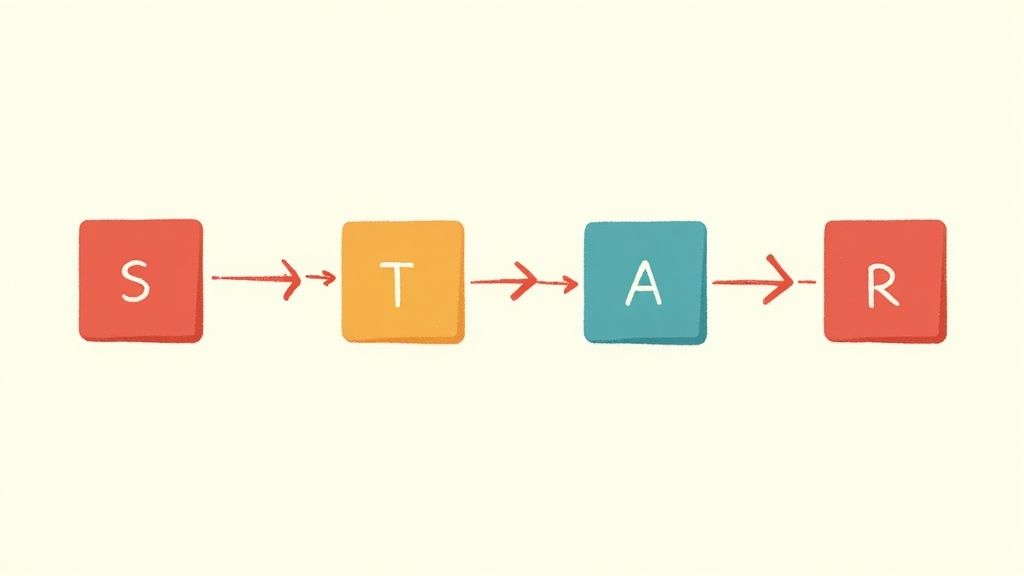
This technique guides you through telling a meaningful story by breaking it down into four parts: Situation (set the scene), Task (describe your responsibility), Action (explain what you did), and Result (share the outcome). It prevents you from getting sidetracked and forces you to focus on the actions you took and the quantifiable results you achieved, which is exactly what hiring managers want to hear.
How to Prepare Your STAR Stories
Having a few well-rehearsed STAR stories ready will give you the confidence to handle any behavioral question that comes your way.
- Brainstorm 5-7 Core Examples: Think of key experiences from previous jobs, internships, or even academic projects. Aim for stories that showcase different skills like leadership, problem-solving, teamwork, and initiative.
- Quantify Your Results: Numbers make your impact undeniable. Instead of saying, "The project was a success," say, "My process improvement initiative reduced project delivery time by 15% and increased client satisfaction scores."
- Align with the Job Description: Review the key requirements for the role. Choose STAR examples that directly demonstrate you have the specific skills and experience the employer is looking for. If they want a "detail-oriented" person, prepare a story about a time you caught a critical error.
Pro Tip: Practice telling your STAR stories out loud. This helps you refine the narrative, ensure a smooth and natural delivery, and commit the key details to memory so you're not fumbling for words during the interview.
Using this method turns a simple answer into a powerful story that proves your value. For a deeper dive, review these additional pointers on how to answer situational interview questions.
3. Prepare Thoughtful Questions for the Interviewer
The end of an interview, when the hiring manager asks, "Do you have any questions for me?", is not a formality. This is your final opportunity to demonstrate your engagement, critical thinking, and genuine interest in the role. Arriving without questions suggests a lack of curiosity or preparation, a critical misstep for anyone seeking to make a strong impression. This is one of the most vital first job interview tips because it shifts the dynamic, turning the interview into a two-way conversation where you also evaluate if the company is the right fit for you.
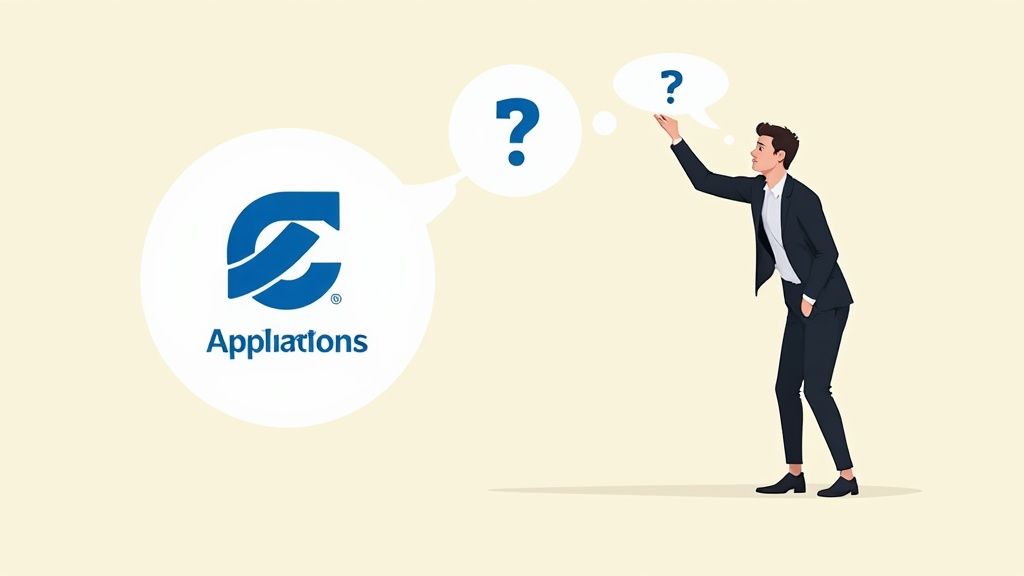
Asking insightful questions proves you were actively listening and thinking critically about the position beyond the job description. It’s the difference between asking nothing and asking, "You mentioned the team is focusing on expanding into new markets; what are the biggest challenges you anticipate with that initiative, and how would this role contribute to overcoming them?" This shows you can think strategically and are already envisioning yourself as a problem-solver within their team.
How to Formulate Effective Questions
To stand out, your questions must be specific, open-ended, and not easily answered with a quick search of the company website. Your goal is to spark a meaningful dialogue.
- Focus on Role, Team, and Growth: Structure your questions around understanding the specifics of the job, the team dynamics, and opportunities for professional development. For example, ask, "What does success look like in this role after the first 90 days?" or "How does the team collaborate on projects, and what are the typical communication channels?"
- Demonstrate You've Been Listening: The best questions often arise from the conversation itself. If the interviewer mentions a specific challenge, make a note and ask a follow-up question about it later. This proves your active listening skills.
- Prepare More Than You Need: Aim to have a list of 8-10 prepared questions. Some may be answered during the interview, so having backups ensures you’re never left empty-handed. Save questions about salary and benefits for later stages unless the interviewer brings them up first.
Pro Tip: Frame questions around the future and the company's big-picture goals. Instead of asking about day-to-day tasks, try asking, "What are the most significant opportunities for the company in the next year, and how is this department positioned to support those goals?"
This strategy positions you as a forward-thinking candidate who is invested in the company's long-term vision, not just in securing a job. This is a powerful way to end your first job interview on a high note.
4. Perfect Your Professional Appearance and First Impression
Long before you answer your first question, you’ve already made an impression. Your appearance and demeanor are the first pieces of data an interviewer collects, and a polished presentation immediately signals professionalism and respect for the opportunity. This is one of the most fundamental first job interview tips because it shows you understand the unspoken rules of the professional world and are serious about the role.
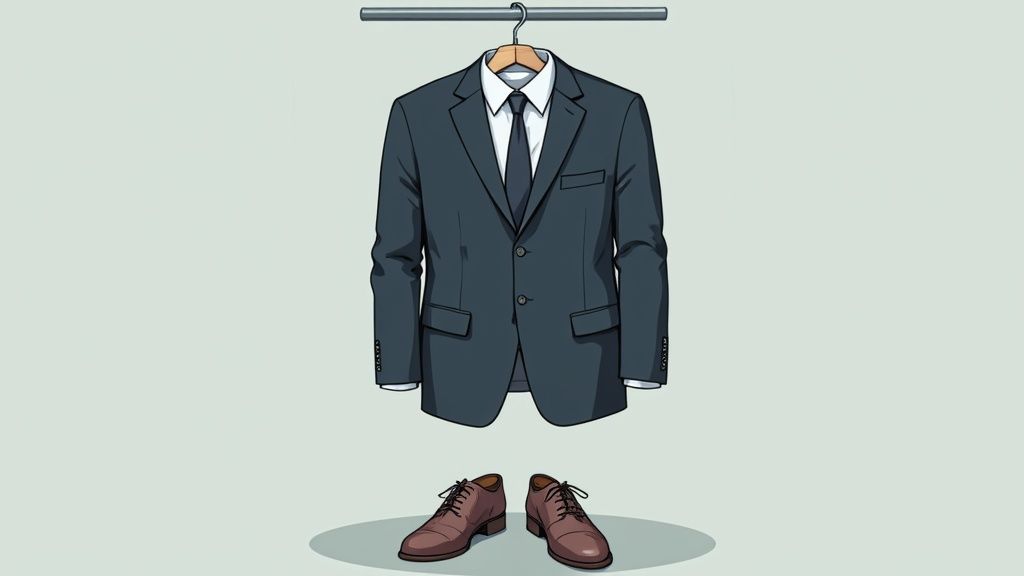
A strong first impression is built on more than just clothes; it’s a combination of appropriate attire, confident body language, and punctuality. When you look the part and carry yourself with confidence, you put both yourself and the interviewer at ease, setting a positive tone for the entire conversation and allowing your skills to take center stage.
How to Make a Powerful First Impression
To ensure your appearance is an asset, not a distraction, you need a deliberate and thoughtful approach. The goal is to project competence and cultural fit.
- Dress One Level Up: A reliable rule is to dress one step above the company’s daily dress code. If the office is business casual (like many tech startups), opt for smart business casual. If it’s a formal corporate or law environment, business formal is non-negotiable. When in doubt, it is always better to be overdressed than underdressed.
- Plan and Prepare Your Outfit: Don’t wait until the morning of the interview. Choose your entire outfit several days in advance, ensure it is clean and ironed, and do a test run to check for comfort and fit. This eliminates last-minute stress and ensures you look put-together.
- Master Non-Verbal Cues: Your body language speaks volumes. A firm (not crushing) handshake, consistent eye contact, and an upright but relaxed posture project confidence and engagement. Avoid fidgeting or crossing your arms, as this can signal nervousness or disinterest.
Pro Tip: Punctuality is part of your first impression. Aim to arrive 10-15 minutes early. This gives you time to find the office, use the restroom, and mentally compose yourself. Arriving earlier can be inconvenient for the interviewer, while arriving late is a major red flag.
By managing these details, you demonstrate meticulousness and respect, qualities highly valued in any employee. For a deeper dive into this, explore these tips for powerful interview body language.
5. Practice Your Elevator Pitch and Self-Introduction
The question "Tell me about yourself" isn't small talk; it's your first and best opportunity to make a powerful impression. Responding with a concise, persuasive summary of your skills and ambitions, known as an elevator pitch, is one of the most vital first job interview tips. This 30 to 60-second introduction sets the tone for the entire conversation, framing you as a confident and prepared candidate from the very beginning.
A well-crafted pitch does more than just list your accomplishments; it tells a compelling story about who you are, what you offer, and why you are the perfect fit for this specific role. It’s the difference between rambling through your resume and delivering a targeted narrative that immediately connects your background to the company's needs. For example, instead of just saying you studied marketing, you can say, "As a recent marketing graduate with internship experience at two digital agencies, I developed a passion for using data to drive campaign success, which I see reflected in your company's innovative approach."
How to Craft a Winning Pitch
Your elevator pitch should be authentic and memorable. The goal is to sound natural and engaging, not like you're reading from a script.
- Structure Your Story: Start with your present (who you are now), connect it to your past (relevant experiences), and pivot to your future (why you're interested in this opportunity). This creates a clear and logical narrative for the interviewer to follow.
- Tailor It to the Role: A generic pitch falls flat. Before the interview, identify the top 2-3 skills or qualifications in the job description and weave them into your introduction to show direct alignment.
- Practice, Don't Memorize: Rehearse your pitch out loud until it flows naturally. Record yourself to check your pacing, tone, and body language. The goal is confident delivery, not robotic recitation.
Pro Tip: End your pitch with a connection to the company or role. A great closing line could be, "...and that's why I was so excited to see this opening for a [Job Title], as it seems like a perfect opportunity to apply my skills in [Skill 1] and [Skill 2] to your team's goals."
This strategy ensures you start the interview on the front foot, demonstrating your communication skills and genuine enthusiasm. For more examples, see these powerful ways to craft an interview elevator pitch.
6. Demonstrate Cultural Fit and Soft Skills
Technical skills might get you the interview, but a strong cultural fit and well-developed soft skills are often what land you the job. Companies hire people, not just resumes. They are looking for individuals whose values, work ethic, and personality will complement the existing team and contribute positively to the workplace environment. This is one of the most vital first job interview tips because it shows you can thrive, not just survive, in their specific setting.
Demonstrating this fit isn't about pretending to be someone you're not; it's about highlighting the aspects of your personality and work style that genuinely align with their culture. It’s the difference between saying "I'm adaptable" and "In a previous project, our client changed the project scope midway through. I took the initiative to learn a new software over the weekend to meet the new requirements, which aligns with the agile and proactive approach I’ve seen emphasized in your company's values."
How to Showcase Your Alignment
Effectively communicating your cultural fit requires a blend of research, self-awareness, and strategic storytelling. You need to connect who you are with who they are as a company.
- Analyze the Company's Vibe: Scour their social media, read employee reviews on sites like Glassdoor, and watch any available videos of the team. Is their communication style formal or casual? Do they emphasize collaboration or individual achievement? Mirror this tone in your interview.
- Frame Your Stories with Soft Skills: When answering behavioral questions ("Tell me about a time when..."), structure your stories to highlight key soft skills like communication, problem-solving, and resilience. Don't just state the outcome; explain how your interpersonal skills led to that success.
- Show Enthusiasm for Their Mission: Connect your personal values or career goals to the company's mission. If they are a sustainability-focused company, share a brief, genuine example of how sustainability is important to you in your own life.
Pro Tip: Your questions are a powerful tool for demonstrating cultural fit. Ask about things that reveal what it’s truly like to work there, such as, "What soft skills have you seen in your most successful team members?" or "How does the team handle constructive feedback and differing opinions?"
This approach proves you are not just looking for any job, but a place where you can make a meaningful contribution and build a long-term career. It shows you’ve thought deeply about your potential role within their unique ecosystem.
7. Handle Salary and Compensation Discussions Strategically
Navigating the salary conversation is one of the most nerve-wracking parts of any interview, especially your first. Mishandling this discussion can lead to undervaluing your skills or appearing presumptuous. A strategic approach ensures you focus on demonstrating your value first, positioning yourself to negotiate a fair compensation package when the time is right. This is a crucial skill among first job interview tips because it sets the foundation for your long-term earning potential.
This careful preparation allows you to enter the conversation with confidence, armed with data and a clear understanding of your worth. It shifts the dynamic from a guessing game to a professional negotiation based on market value and the specific contributions you bring to the role. It’s the difference between hesitantly accepting the first number offered and confidently advocating for a salary that reflects your qualifications.
How to Navigate Compensation Talks
The key is to let the employer initiate the salary conversation, but you must be prepared for when they do. Your goal is to defer until you have a clear offer, but have a researched range ready if pressed.
- Research Industry Standards: Before the interview, use resources like Glassdoor, PayScale, and industry-specific reports to determine a realistic salary range for your role, experience level, and geographic location.
- Deflect Early Questions: If asked about your salary expectations early on, politely shift the focus. Try saying, "I’m focused on finding a role that's a great fit for my skills and career goals. I'm confident we can agree on a fair number if we both feel this is the right opportunity. What is the budgeted range for this position?"
- Consider the Total Package: Remember that compensation isn't just about the base salary. Factor in benefits like health insurance, retirement contributions, paid time off, and opportunities for professional development when evaluating an offer.
Pro Tip: When you provide a range, make sure the lowest number is one you would be happy to accept. State your expectations confidently, such as, "Based on my research for similar roles in this market and my qualifications in [specific skill], I am seeking a salary in the range of $X to $Y."
This method ensures you are compensated fairly without derailing the interview process. For a deeper dive into crafting the perfect response, review these detailed strategies on how to answer salary expectations.
8. Prepare for Common Interview Challenges and Difficult Questions
An interview isn't just about highlighting your strengths; it's also about how you handle pressure and address potential concerns. Anticipating tough questions about weaknesses, employment gaps, or inexperience is a critical part of your preparation. This forward-thinking strategy is one of the most vital first job interview tips because it allows you to control the narrative, turning potential red flags into demonstrations of self-awareness, resilience, and growth.
A well-prepared response to a difficult question can be more impressive than a perfect answer to an easy one. It shows maturity and honesty. The goal isn't to pretend you're flawless but to show you are proactive and committed to professional development, which is a highly valued trait in any new hire.
How to Address Difficult Questions
To navigate these challenges successfully, focus on framing your experiences positively and demonstrating a growth mindset. Preparation is key to delivering a calm, confident response.
- Frame Weaknesses as Growth Opportunities: When asked about your greatest weakness, avoid clichés. Instead, choose a real area of development, explain the steps you're taking to improve, and share your progress. For example, "In past academic projects, I sometimes over-focused on details, so I've adopted time-management techniques like the Pomodoro method to ensure I balance detail with deadlines effectively."
- Explain Gaps with Confidence: Address any resume gaps honestly and concisely. Frame the time off in terms of the skills you gained. For instance, "I took a planned year off to care for a family member, a role that significantly strengthened my skills in time management, empathy, and problem-solving under pressure."
- Bridge Experience Gaps with Transferable Skills: If you lack direct experience, connect what you have done to what the role requires. Say, "While I haven't held a formal project management title, my experience organizing a university-wide charity event gave me hands-on practice in budgeting, coordinating with stakeholders, and meeting strict deadlines."
Pro Tip: Don't memorize a script, but have your key points ready. The goal is to sound authentic, not rehearsed. Practice saying your answers out loud to a friend or mentor to ensure they sound natural and confident.
Handling these questions gracefully proves you can stay composed under pressure and are a thoughtful, self-aware candidate. For more practice, you can use tools that offer AI-powered mock interviews, like those found on AIApply, to refine your responses.
First Interview Tips: 8-Point Strategy Comparison
Turn Interview Nerves into Your Competitive Advantage
Navigating your first job interview can feel like a high-stakes performance, but it doesn't have to be a source of anxiety. Instead, view it as your first real opportunity to transform from a name on a resume into a compelling, three-dimensional professional. The journey from applicant to new hire is paved with preparation, and you now have the complete roadmap.
By internalizing the strategies we've covered, you're building a powerful framework for success. You're no longer just hoping for the best; you're actively architecting your desired outcome. From conducting deep-dive company research that uncovers real insights to mastering the STAR method to narrate your accomplishments, each step is a building block of confidence. You've learned how to craft thoughtful questions that demonstrate genuine curiosity, handle tricky salary discussions with poise, and present a polished first impression that speaks volumes before you even say a word.
From Preparation to Performance
The true value of these first job interview tips lies not in just knowing them, but in internalizing them until they become second nature. This is where practice becomes indispensable.
- Elevator Pitch: Rehearse your self-introduction until it sounds natural and confident, not robotic. Record yourself to catch awkward phrasing or nervous habits.
- Behavioral Questions: Don't just outline STAR stories; tell them out loud. This helps you refine your narrative, manage your timing, and ensure your key achievements shine through.
- Tough Questions: Practice answering questions about your weaknesses or past failures. The goal is to turn potential liabilities into demonstrations of self-awareness and growth.
This deliberate practice transforms nervous energy into focused, positive momentum. When you walk into that interview room, you won't be grappling with what to say. Instead, you'll be fully present, ready to listen, engage, and connect with your interviewer on a genuine level.
Your Next Chapter Awaits
Ultimately, a successful first job interview is a conversation, not an interrogation. It's a chance to show a company not just what you can do, but who you are. Your enthusiasm, authenticity, and preparedness are your most powerful assets. By treating this milestone as a strategic opportunity to showcase your unique value, you shift the dynamic from one of pressure to one of possibility. You are not just there to ask for a job; you are there to demonstrate why you are the right person to help solve their problems and contribute to their mission. Embrace the challenge, trust your preparation, and step confidently toward the career you deserve.
Ready to put these tips into practice? Don't leave your performance to chance. Elevate your preparation with AIApply's advanced AI Interview Coach, which provides realistic mock interviews and instant, personalized feedback to sharpen your answers. Visit AIApply to build the confidence you need to land your dream job.
Stepping into your first job interview can feel like a high-stakes performance where you're both the star and the entire crew. The pressure is on, the competition is fierce, and making a memorable first impression is everything. But don't let the nerves win. With the right preparation and strategy, you can transform this challenge into a career-launching opportunity. This guide provides a comprehensive breakdown of essential first job interview tips designed to give you a competitive edge.
We'll move beyond generic advice like "be confident" and dive straight into actionable strategies. You'll learn how to master the STAR method for answering behavioral questions, how to research a company so thoroughly you seem like a long-time employee, and how to prepare thoughtful questions that make the interviewer see you as a serious candidate.
This isn't just about what to say; it's about how to prepare. We'll show you how to demonstrate cultural fit, handle tricky salary discussions, and perfect your professional appearance. This list is your blueprint for walking into that room with unshakable confidence and leaving a lasting, positive impact. Let's get you ready to not just answer questions, but to tell a compelling story about why you're the perfect fit.
1. Research the Company Thoroughly
Walking into your first job interview without knowing the company is like showing up for a final exam you haven't studied for. Superficial research won't cut it. True preparation involves a deep dive into the organization’s mission, values, recent news, and market position. This foundational step is one of the most critical first job interview tips because it transforms you from a generic applicant into a candidate who is genuinely invested in the company's success.

This level of detail allows you to tailor every response, connecting your skills and experiences directly to their specific needs and goals. It’s the difference between saying "I'm a good team player" and "I was impressed by your recent collaborative project on [Project Name], and my experience in [your skill] would align perfectly with that kind of team-based, innovative work."
How to Conduct Effective Research
To stand out, your research must go beyond the homepage. Focus on uncovering insights that demonstrate your initiative and strategic thinking.
- Go Beyond the "About Us" Page: Start there, but quickly move to press releases, recent news articles, and the company’s LinkedIn or social media feeds. A startup's recent funding round or a nonprofit's latest community impact report are goldmines of information.
- Understand Their Place in the Market: Who are their main competitors? What makes this company unique? Knowing this helps you articulate why you want to work for them specifically, not just any company in the industry.
- Research Your Interviewer: Look up your interviewer(s) on LinkedIn. Understanding their career path and role at the company can help you build rapport and ask more targeted questions.
Pro Tip: Your research should culminate in 2-3 specific, thoughtful questions. Instead of asking "What is the company culture like?", try "I read about your new initiative to promote employee wellness; how has that been received by the team and what impact has it made on the culture?"
This approach proves your genuine interest and shows you are a proactive problem-solver, not just a passive job seeker. For an in-depth guide, explore these additional strategies on how to research a company effectively.
2. Master the STAR Method for Behavioral Questions
Behavioral questions, which often start with "Tell me about a time when...", are designed to see how you've handled work situations in the past. Answering them with a rambling story is a common misstep. The STAR method provides a structured framework to deliver a clear, concise, and impactful response, making it one of the most essential first job interview tips for demonstrating your true capabilities.

This technique guides you through telling a meaningful story by breaking it down into four parts: Situation (set the scene), Task (describe your responsibility), Action (explain what you did), and Result (share the outcome). It prevents you from getting sidetracked and forces you to focus on the actions you took and the quantifiable results you achieved, which is exactly what hiring managers want to hear.
How to Prepare Your STAR Stories
Having a few well-rehearsed STAR stories ready will give you the confidence to handle any behavioral question that comes your way.
- Brainstorm 5-7 Core Examples: Think of key experiences from previous jobs, internships, or even academic projects. Aim for stories that showcase different skills like leadership, problem-solving, teamwork, and initiative.
- Quantify Your Results: Numbers make your impact undeniable. Instead of saying, "The project was a success," say, "My process improvement initiative reduced project delivery time by 15% and increased client satisfaction scores."
- Align with the Job Description: Review the key requirements for the role. Choose STAR examples that directly demonstrate you have the specific skills and experience the employer is looking for. If they want a "detail-oriented" person, prepare a story about a time you caught a critical error.
Pro Tip: Practice telling your STAR stories out loud. This helps you refine the narrative, ensure a smooth and natural delivery, and commit the key details to memory so you're not fumbling for words during the interview.
Using this method turns a simple answer into a powerful story that proves your value. For a deeper dive, review these additional pointers on how to answer situational interview questions.
3. Prepare Thoughtful Questions for the Interviewer
The end of an interview, when the hiring manager asks, "Do you have any questions for me?", is not a formality. This is your final opportunity to demonstrate your engagement, critical thinking, and genuine interest in the role. Arriving without questions suggests a lack of curiosity or preparation, a critical misstep for anyone seeking to make a strong impression. This is one of the most vital first job interview tips because it shifts the dynamic, turning the interview into a two-way conversation where you also evaluate if the company is the right fit for you.

Asking insightful questions proves you were actively listening and thinking critically about the position beyond the job description. It’s the difference between asking nothing and asking, "You mentioned the team is focusing on expanding into new markets; what are the biggest challenges you anticipate with that initiative, and how would this role contribute to overcoming them?" This shows you can think strategically and are already envisioning yourself as a problem-solver within their team.
How to Formulate Effective Questions
To stand out, your questions must be specific, open-ended, and not easily answered with a quick search of the company website. Your goal is to spark a meaningful dialogue.
- Focus on Role, Team, and Growth: Structure your questions around understanding the specifics of the job, the team dynamics, and opportunities for professional development. For example, ask, "What does success look like in this role after the first 90 days?" or "How does the team collaborate on projects, and what are the typical communication channels?"
- Demonstrate You've Been Listening: The best questions often arise from the conversation itself. If the interviewer mentions a specific challenge, make a note and ask a follow-up question about it later. This proves your active listening skills.
- Prepare More Than You Need: Aim to have a list of 8-10 prepared questions. Some may be answered during the interview, so having backups ensures you’re never left empty-handed. Save questions about salary and benefits for later stages unless the interviewer brings them up first.
Pro Tip: Frame questions around the future and the company's big-picture goals. Instead of asking about day-to-day tasks, try asking, "What are the most significant opportunities for the company in the next year, and how is this department positioned to support those goals?"
This strategy positions you as a forward-thinking candidate who is invested in the company's long-term vision, not just in securing a job. This is a powerful way to end your first job interview on a high note.
4. Perfect Your Professional Appearance and First Impression
Long before you answer your first question, you’ve already made an impression. Your appearance and demeanor are the first pieces of data an interviewer collects, and a polished presentation immediately signals professionalism and respect for the opportunity. This is one of the most fundamental first job interview tips because it shows you understand the unspoken rules of the professional world and are serious about the role.

A strong first impression is built on more than just clothes; it’s a combination of appropriate attire, confident body language, and punctuality. When you look the part and carry yourself with confidence, you put both yourself and the interviewer at ease, setting a positive tone for the entire conversation and allowing your skills to take center stage.
How to Make a Powerful First Impression
To ensure your appearance is an asset, not a distraction, you need a deliberate and thoughtful approach. The goal is to project competence and cultural fit.
- Dress One Level Up: A reliable rule is to dress one step above the company’s daily dress code. If the office is business casual (like many tech startups), opt for smart business casual. If it’s a formal corporate or law environment, business formal is non-negotiable. When in doubt, it is always better to be overdressed than underdressed.
- Plan and Prepare Your Outfit: Don’t wait until the morning of the interview. Choose your entire outfit several days in advance, ensure it is clean and ironed, and do a test run to check for comfort and fit. This eliminates last-minute stress and ensures you look put-together.
- Master Non-Verbal Cues: Your body language speaks volumes. A firm (not crushing) handshake, consistent eye contact, and an upright but relaxed posture project confidence and engagement. Avoid fidgeting or crossing your arms, as this can signal nervousness or disinterest.
Pro Tip: Punctuality is part of your first impression. Aim to arrive 10-15 minutes early. This gives you time to find the office, use the restroom, and mentally compose yourself. Arriving earlier can be inconvenient for the interviewer, while arriving late is a major red flag.
By managing these details, you demonstrate meticulousness and respect, qualities highly valued in any employee. For a deeper dive into this, explore these tips for powerful interview body language.
5. Practice Your Elevator Pitch and Self-Introduction
The question "Tell me about yourself" isn't small talk; it's your first and best opportunity to make a powerful impression. Responding with a concise, persuasive summary of your skills and ambitions, known as an elevator pitch, is one of the most vital first job interview tips. This 30 to 60-second introduction sets the tone for the entire conversation, framing you as a confident and prepared candidate from the very beginning.
A well-crafted pitch does more than just list your accomplishments; it tells a compelling story about who you are, what you offer, and why you are the perfect fit for this specific role. It’s the difference between rambling through your resume and delivering a targeted narrative that immediately connects your background to the company's needs. For example, instead of just saying you studied marketing, you can say, "As a recent marketing graduate with internship experience at two digital agencies, I developed a passion for using data to drive campaign success, which I see reflected in your company's innovative approach."
How to Craft a Winning Pitch
Your elevator pitch should be authentic and memorable. The goal is to sound natural and engaging, not like you're reading from a script.
- Structure Your Story: Start with your present (who you are now), connect it to your past (relevant experiences), and pivot to your future (why you're interested in this opportunity). This creates a clear and logical narrative for the interviewer to follow.
- Tailor It to the Role: A generic pitch falls flat. Before the interview, identify the top 2-3 skills or qualifications in the job description and weave them into your introduction to show direct alignment.
- Practice, Don't Memorize: Rehearse your pitch out loud until it flows naturally. Record yourself to check your pacing, tone, and body language. The goal is confident delivery, not robotic recitation.
Pro Tip: End your pitch with a connection to the company or role. A great closing line could be, "...and that's why I was so excited to see this opening for a [Job Title], as it seems like a perfect opportunity to apply my skills in [Skill 1] and [Skill 2] to your team's goals."
This strategy ensures you start the interview on the front foot, demonstrating your communication skills and genuine enthusiasm. For more examples, see these powerful ways to craft an interview elevator pitch.
6. Demonstrate Cultural Fit and Soft Skills
Technical skills might get you the interview, but a strong cultural fit and well-developed soft skills are often what land you the job. Companies hire people, not just resumes. They are looking for individuals whose values, work ethic, and personality will complement the existing team and contribute positively to the workplace environment. This is one of the most vital first job interview tips because it shows you can thrive, not just survive, in their specific setting.
Demonstrating this fit isn't about pretending to be someone you're not; it's about highlighting the aspects of your personality and work style that genuinely align with their culture. It’s the difference between saying "I'm adaptable" and "In a previous project, our client changed the project scope midway through. I took the initiative to learn a new software over the weekend to meet the new requirements, which aligns with the agile and proactive approach I’ve seen emphasized in your company's values."
How to Showcase Your Alignment
Effectively communicating your cultural fit requires a blend of research, self-awareness, and strategic storytelling. You need to connect who you are with who they are as a company.
- Analyze the Company's Vibe: Scour their social media, read employee reviews on sites like Glassdoor, and watch any available videos of the team. Is their communication style formal or casual? Do they emphasize collaboration or individual achievement? Mirror this tone in your interview.
- Frame Your Stories with Soft Skills: When answering behavioral questions ("Tell me about a time when..."), structure your stories to highlight key soft skills like communication, problem-solving, and resilience. Don't just state the outcome; explain how your interpersonal skills led to that success.
- Show Enthusiasm for Their Mission: Connect your personal values or career goals to the company's mission. If they are a sustainability-focused company, share a brief, genuine example of how sustainability is important to you in your own life.
Pro Tip: Your questions are a powerful tool for demonstrating cultural fit. Ask about things that reveal what it’s truly like to work there, such as, "What soft skills have you seen in your most successful team members?" or "How does the team handle constructive feedback and differing opinions?"
This approach proves you are not just looking for any job, but a place where you can make a meaningful contribution and build a long-term career. It shows you’ve thought deeply about your potential role within their unique ecosystem.
7. Handle Salary and Compensation Discussions Strategically
Navigating the salary conversation is one of the most nerve-wracking parts of any interview, especially your first. Mishandling this discussion can lead to undervaluing your skills or appearing presumptuous. A strategic approach ensures you focus on demonstrating your value first, positioning yourself to negotiate a fair compensation package when the time is right. This is a crucial skill among first job interview tips because it sets the foundation for your long-term earning potential.
This careful preparation allows you to enter the conversation with confidence, armed with data and a clear understanding of your worth. It shifts the dynamic from a guessing game to a professional negotiation based on market value and the specific contributions you bring to the role. It’s the difference between hesitantly accepting the first number offered and confidently advocating for a salary that reflects your qualifications.
How to Navigate Compensation Talks
The key is to let the employer initiate the salary conversation, but you must be prepared for when they do. Your goal is to defer until you have a clear offer, but have a researched range ready if pressed.
- Research Industry Standards: Before the interview, use resources like Glassdoor, PayScale, and industry-specific reports to determine a realistic salary range for your role, experience level, and geographic location.
- Deflect Early Questions: If asked about your salary expectations early on, politely shift the focus. Try saying, "I’m focused on finding a role that's a great fit for my skills and career goals. I'm confident we can agree on a fair number if we both feel this is the right opportunity. What is the budgeted range for this position?"
- Consider the Total Package: Remember that compensation isn't just about the base salary. Factor in benefits like health insurance, retirement contributions, paid time off, and opportunities for professional development when evaluating an offer.
Pro Tip: When you provide a range, make sure the lowest number is one you would be happy to accept. State your expectations confidently, such as, "Based on my research for similar roles in this market and my qualifications in [specific skill], I am seeking a salary in the range of $X to $Y."
This method ensures you are compensated fairly without derailing the interview process. For a deeper dive into crafting the perfect response, review these detailed strategies on how to answer salary expectations.
8. Prepare for Common Interview Challenges and Difficult Questions
An interview isn't just about highlighting your strengths; it's also about how you handle pressure and address potential concerns. Anticipating tough questions about weaknesses, employment gaps, or inexperience is a critical part of your preparation. This forward-thinking strategy is one of the most vital first job interview tips because it allows you to control the narrative, turning potential red flags into demonstrations of self-awareness, resilience, and growth.
A well-prepared response to a difficult question can be more impressive than a perfect answer to an easy one. It shows maturity and honesty. The goal isn't to pretend you're flawless but to show you are proactive and committed to professional development, which is a highly valued trait in any new hire.
How to Address Difficult Questions
To navigate these challenges successfully, focus on framing your experiences positively and demonstrating a growth mindset. Preparation is key to delivering a calm, confident response.
- Frame Weaknesses as Growth Opportunities: When asked about your greatest weakness, avoid clichés. Instead, choose a real area of development, explain the steps you're taking to improve, and share your progress. For example, "In past academic projects, I sometimes over-focused on details, so I've adopted time-management techniques like the Pomodoro method to ensure I balance detail with deadlines effectively."
- Explain Gaps with Confidence: Address any resume gaps honestly and concisely. Frame the time off in terms of the skills you gained. For instance, "I took a planned year off to care for a family member, a role that significantly strengthened my skills in time management, empathy, and problem-solving under pressure."
- Bridge Experience Gaps with Transferable Skills: If you lack direct experience, connect what you have done to what the role requires. Say, "While I haven't held a formal project management title, my experience organizing a university-wide charity event gave me hands-on practice in budgeting, coordinating with stakeholders, and meeting strict deadlines."
Pro Tip: Don't memorize a script, but have your key points ready. The goal is to sound authentic, not rehearsed. Practice saying your answers out loud to a friend or mentor to ensure they sound natural and confident.
Handling these questions gracefully proves you can stay composed under pressure and are a thoughtful, self-aware candidate. For more practice, you can use tools that offer AI-powered mock interviews, like those found on AIApply, to refine your responses.
First Interview Tips: 8-Point Strategy Comparison
Turn Interview Nerves into Your Competitive Advantage
Navigating your first job interview can feel like a high-stakes performance, but it doesn't have to be a source of anxiety. Instead, view it as your first real opportunity to transform from a name on a resume into a compelling, three-dimensional professional. The journey from applicant to new hire is paved with preparation, and you now have the complete roadmap.
By internalizing the strategies we've covered, you're building a powerful framework for success. You're no longer just hoping for the best; you're actively architecting your desired outcome. From conducting deep-dive company research that uncovers real insights to mastering the STAR method to narrate your accomplishments, each step is a building block of confidence. You've learned how to craft thoughtful questions that demonstrate genuine curiosity, handle tricky salary discussions with poise, and present a polished first impression that speaks volumes before you even say a word.
From Preparation to Performance
The true value of these first job interview tips lies not in just knowing them, but in internalizing them until they become second nature. This is where practice becomes indispensable.
- Elevator Pitch: Rehearse your self-introduction until it sounds natural and confident, not robotic. Record yourself to catch awkward phrasing or nervous habits.
- Behavioral Questions: Don't just outline STAR stories; tell them out loud. This helps you refine your narrative, manage your timing, and ensure your key achievements shine through.
- Tough Questions: Practice answering questions about your weaknesses or past failures. The goal is to turn potential liabilities into demonstrations of self-awareness and growth.
This deliberate practice transforms nervous energy into focused, positive momentum. When you walk into that interview room, you won't be grappling with what to say. Instead, you'll be fully present, ready to listen, engage, and connect with your interviewer on a genuine level.
Your Next Chapter Awaits
Ultimately, a successful first job interview is a conversation, not an interrogation. It's a chance to show a company not just what you can do, but who you are. Your enthusiasm, authenticity, and preparedness are your most powerful assets. By treating this milestone as a strategic opportunity to showcase your unique value, you shift the dynamic from one of pressure to one of possibility. You are not just there to ask for a job; you are there to demonstrate why you are the right person to help solve their problems and contribute to their mission. Embrace the challenge, trust your preparation, and step confidently toward the career you deserve.
Ready to put these tips into practice? Don't leave your performance to chance. Elevate your preparation with AIApply's advanced AI Interview Coach, which provides realistic mock interviews and instant, personalized feedback to sharpen your answers. Visit AIApply to build the confidence you need to land your dream job.
Don't miss out on
your next opportunity.
Create and send applications in seconds, not hours.






